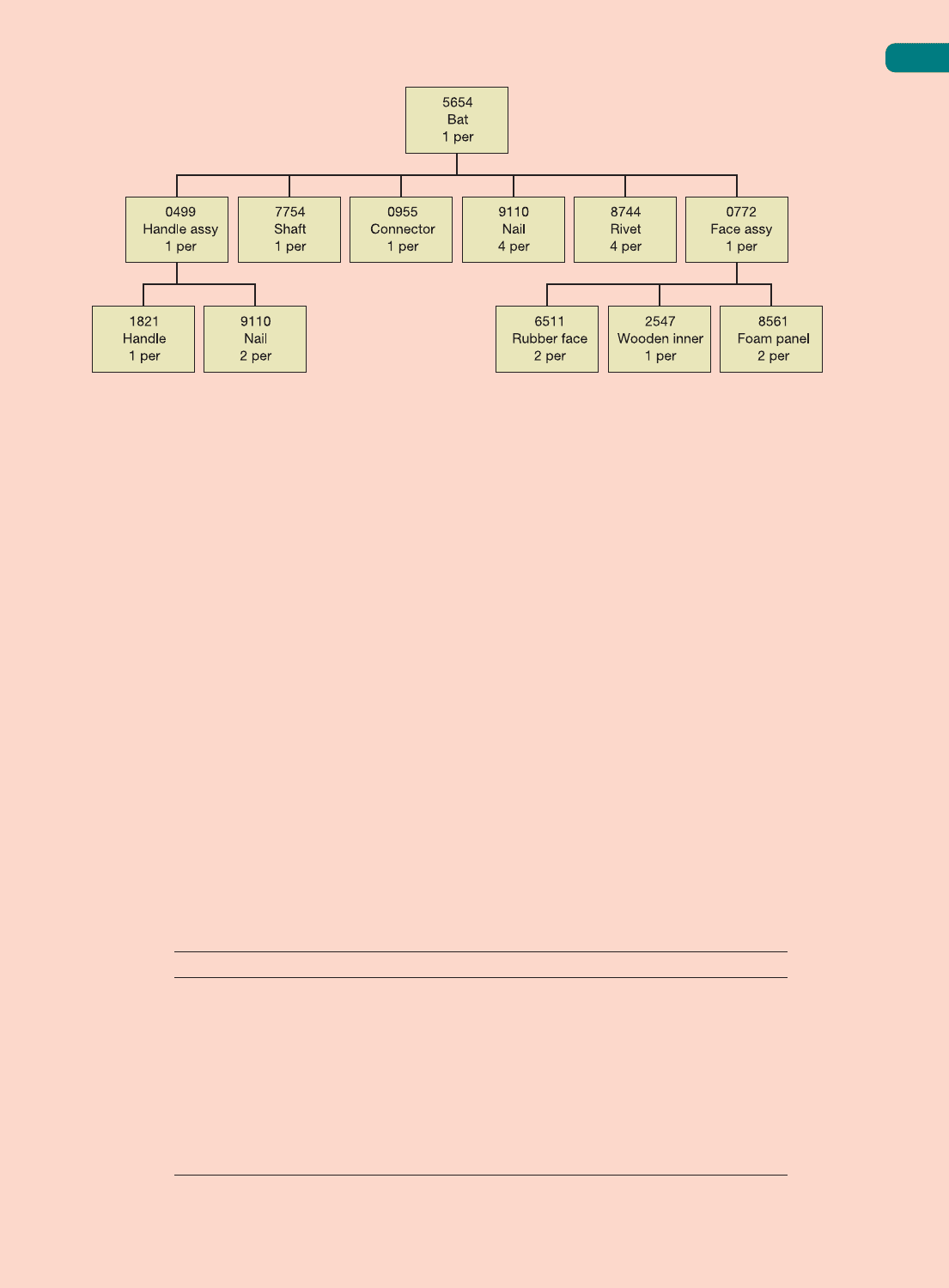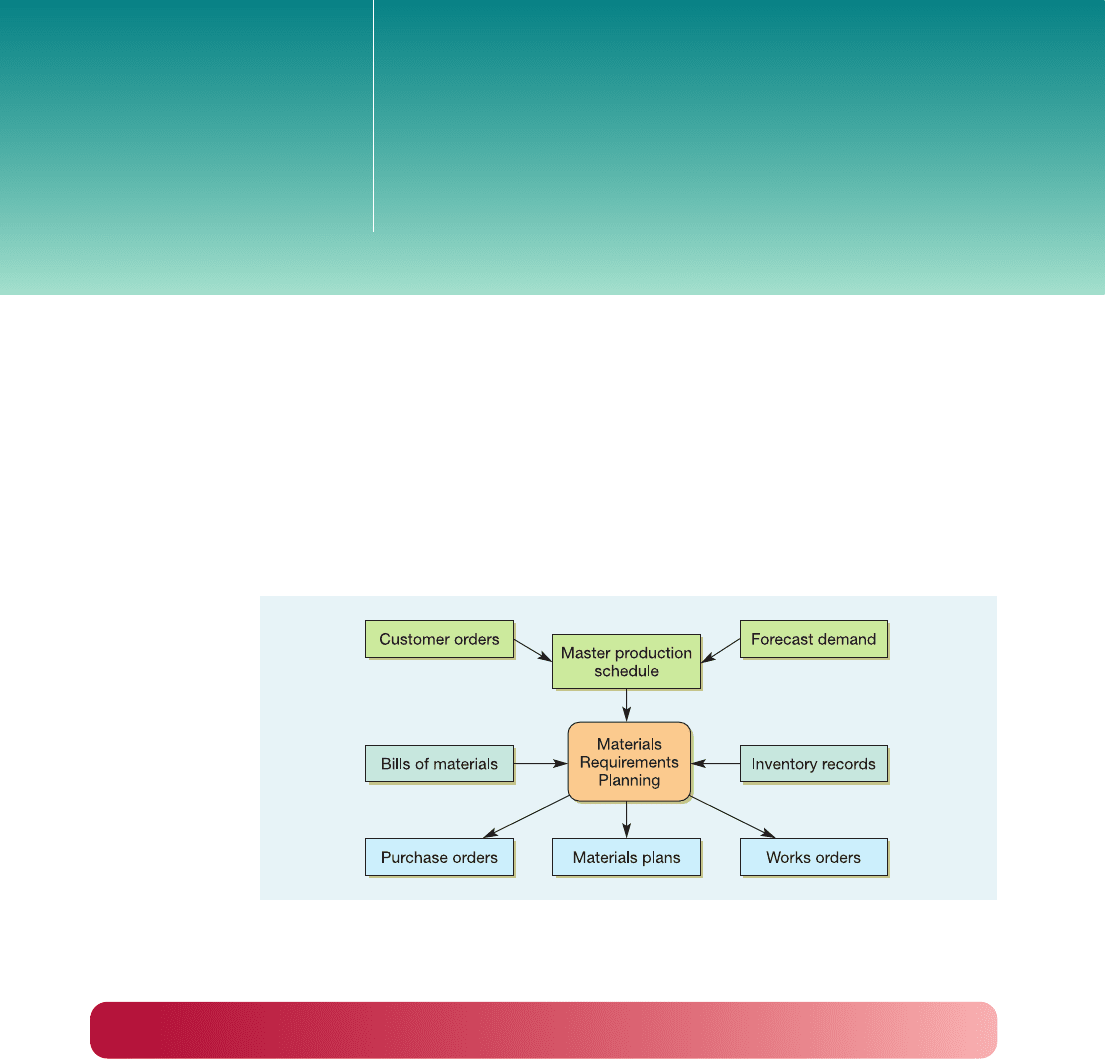Nigel S., Chambers S., Johnson R. Operations Management
Подождите немного. Документ загружается.


Web-integrated ERP
Perhaps the most important justification for embarking on ERP is the potential it gives the
organization to link up with the outside world. For example, it is much easier for an operation
to move into internet-based trading if it can integrate its external Internet systems into its
internal ERP systems. However, as has been pointed out by some critics of the ERP soft-
ware companies, ERP vendors were not prepared for the impact of e-commerce and had not
made sufficient allowance in their products for the need to interface with internet-based
communication channels. The result of this has been that whereas the internal complexity
of ERP systems was designed only to be intelligible to systems experts, the Internet has
meant that customers and suppliers (who are non-experts) are demanding access to the same
information. So, important pieces of information such as the status of orders, whether pro-
ducts are in stock, the progress of invoicing, etc., need to be available, via the ERP system, on
a company’s web site.
One problem is that different types of external company often need different types of
information. Customers need to check the progress of their orders and invoicing, whereas
suppliers and other partners want access to the details of operations planning and control. Not
only that, but they want access all the time. The Internet is always there, but web-integrated
ERP systems are often complex and need periodic maintenance. This can mean that every
time the ERP system is taken offline for routine maintenance or other changes, the web site
also goes offline. To combat this some companies configure their ERP and e-commerce links
in such a way that they can be decoupled so that ERP can be periodically shut down without
affecting the company’s web presence.
Web-integrated ERP
Part Three Planning and control
414
The market-leading ERP systems supplier SAP, like
many other similar companies, relies on independent
consultants to sell and implement its products. Here is a
typical example.
Satyam Computer Services Ltd., a global consulting
and IT services provider, announced in 2009 that it had
been awarded a contract to implement a SAP product
(SAP Business All-in-One) for Vijay Dairy & Farm
Products, one of the leading dairy processors in India.
The dairy firm started in 1995. It produces milk and milk
products, such as butter, ghee, curd, butter milk, and
flavoured milk in bottles, by buying surplus cows’ milk
from farmers and using superior technology to process it.
It has a processing capacity of 125,000 litres of cows’
milk per day, and a distribution network covering the
entire state of Tamil Nadu. With demanding hygiene
requirements, perishable products and supply schedules
that demand daily accuracy, managing the company’s
planning process is a complex task. That is why the
company opted for an ERP system to help it keep control
of its operations. The ERP solution should automate and
integrate key business processes across the company,
speeding workflow, improving quality, and lowering costs.
‘Managing our supply – especially procurement and
pricing – is a complex process that will now be greatly
Short case
SAP at Vijay Dairy & Farm
Pr
oducts
6
simplified. Stand-alone processes will be integrated for
the first time, and we will be able to monitor product
quality at multiple points during procurement and
production, enabling us to deliver the freshest quality
products to customers at lower costs’ (J. Madhan Mohan,
Managing Director, Vijay Dairy & Farm Products).
But why did they choose Satyam to implement the
new ERP system? ‘Satyam understands the business
challenges faced by Vijay Dairy & Farm Products, and
will deliver a powerful, proven solution to transform
their entire Procurement-to-Sales process’, said Manish
Mehta, Global Head, SAP and Managed Testing Practices
at Satyam. ‘Decision-makers at Vijay will have much
Source: Alamy Images
M14A_SLAC0460_06_SE_C14A.QXD 10/20/09 9:46 Page 414

Chapter 14 Enterprise resource planning (ERP)
415
faster access to more (and more accurate) information
from across their enterprise, resulting in improved
operational efficiency and effectiveness’, he added.
Satyam is also an Indian company, although it has
operations world-wide, so it fully understands the
operating and implementation environment. At the
same time it is a global information technology
company, with experience of ERP and other systems
implementations in many industries. ‘We selected Satyam
for their unrivaled SAP credentials, their strong domain
knowledge, and their ability to deliver a cost-effective
solution in less time. Satyam also demonstrated excellent
partnership abilities [it] means lower risk and faster
deployment’ (Manish Mehta).
Supply chain ERP
The step beyond integrating internal ERP systems with immediate customers and suppliers
is to integrate all the ERP and similar systems along a supply chain. Of course, this can never
be straightforward and is often exceptionally complicated. Not only do different ERP systems
have to communicate together, they have to integrate with other types of system. For example,
sales and marketing functions often use systems such as customer relationship management
(CRM, see Chapter 13) that manage the complexities of customer requirements, promises
and transactions. Getting ERP and CRM systems to work together is itself often difficult.
Sometimes the information from ERP systems has to be translated into a form that CRM and
other e-commerce applications are able to understand. Nevertheless, such web-integrated
ERP or c-commerce (collaborative commerce) applications are emerging and starting to
make an impact on the way companies do business. Although a formidable task, the benefits
are potentially great. The costs of communicating between supply chain partners could be
dramatically reduced and the potential for avoiding errors as information and products move
between partners in the supply chain are significant. Yet, as a final warning note, it is well to
remember that although integration can bring all the benefits of increased transparency in a
supply chain, it may also transmit systems failure. If the ERP system of one operation within
a supply chain fails for some reason, it may block the effective operation of the whole integrated
information system throughout the chain.
Implementation of ERP systems
By their nature, ERP systems are designed to address problems of information fragmentation.
Therefore any ERP system will be complex and difficult to get right. Implementing this type
of system will necessarily involve crossing organizational boundaries and integrating internal
processes that cover many, if not all, functional areas of a business. Building a single system
that simultaneously satisfies the requirements of operations managers, marketing and sales
managers, finance managers and everyone else in the organization is never going to be easy.
It is likely that each function will have its own set of processes and a well-understood system
that has been designed for its specific needs. Moving everyone onto a single, integrated system
that runs off a single database is going to be potentially very unpopular. Furthermore, few
people like to change, and ERP asks almost everyone to change how they do their jobs. If ERP
implementation were not difficult there would not be so many reports of the failure of
ERP implementations, or even the complete abandonment of systems.
One of the key issues in ERP implementation is what critical success factors (CSFs) should
be managed to increase the chances of a successful implementation. In this case, CSFs are those
things that the organization must ‘get right’ in order for the ERP system to work effectively.
Much of the research in this area has been summarized by Finney and Corbett
7
who distinguish
between the broad, organization-wide or strategic factors, and the more project specific, or
tactical, factors. These are shown in Table 14.2.
M14A_SLAC0460_06_SE_C14A.QXD 10/20/09 9:46 Page 415

Of course, some of these CSFs could be appropriate for any kind of complex implementa-
tion, whether of an ERP system or some other major change to an operation. But that is the
point. ERP implementation certainly has some specific technical requirements, but good ERP
implementation practice is very similar to other complicated and sensitive implementations.
Again, what is different about ERP is that it is enterprise-wide, so implementation should
always be considered on an enterprise-wide level. Therefore there will at all times be many
different stakeholders to consider, each with their own concerns. That is why implementing
an ERP system is always going to be an exercise in change management. Only if the anxieties
of all relevant groups are addressed effectively will the prospect of achieving superior system
performance be high.
Part Three Planning and control
416
Table 14.2 Strategic and tactical critical success factors (CSF) related to successful ERP
implementation
Strategic critical success factors
• Top management commitment and
support – strong and committed
leadership at the top management level
is essential to the success of an ERP
implementation
• Visioning and planning – articulating a
business vision to the organization,
identifying clear goals and objectives,
and providing a clear link between
business goals and systems strategy
• Project champion – the individual should
possess strong leadership skills as well
as business, technical and personal
managerial competencies
• Implementation strategy and time
frame – implement the ERP under a
time-phased approach
• Project management – the ongoing
management of the implementation plan
• Change management – this concept
refers to the need for the implementation
team to formally prepare a change
management programme and be
conscious of the need to consider the
implications of such a project. One key
task is to build user acceptance of the
project and a positive employee attitude.
This might be accomplished through
education about the benefits and need
for an ERP system. Part of this building
of user acceptance should also involve
securing the support of opinion leaders
throughout the organization. There is
also a need for the team leader to
effectively negotiate between various
political turfs. Some authorities also
stress that in planning the ERP project,
it must be looked upon as a change
management initiative not an IT initiative
Based on Sherry Finney and Martin Corbett (2007) ERP implementation: a compilation and analysis of critical
success factors, Business Process Management Journal, vol. 13, no. 3, 329–47.
Tactical critical success factors
• Balanced team – the need for an implementation
team that spans the organization, as well as
one that possesses a balance of business and
IT skills
• Project team – there is a critical need to put in
place a solid, core implementation team that
is composed of the organization’s ‘best and
brightest’ individuals. These individuals should
have a proven reputation and there should be a
commitment to ‘release’ these individuals to the
project on a full-time basis
• Communication plan – planned communication
among various functions and organizational
levels (specifically between business and IT
personnel) is important to ensure that open
communication occurs within the entire
organization, as well as with suppliers and
customers
• Project cost planning and management – it is
important to know upfront exactly what the
implementation costs will be and dedicate the
necessary budget
• IT infrastructure – it is critical to assess the IT
readiness of the organization, including the
architecture and skills. If necessary,
infrastructure might need to be upgraded or
revamped
• Selection of ERP – the selection of an
appropriate ERP package that matches the
business’s processes
• Consultant selection and relationship – some
authorities advocate the need to include an ERP
consultant as part of the implementation team
• Training and job redesign – training is a critical
aspect of an implementation. It is also necessary
to consider the impact of the change on the
nature of work and the specific job descriptions
• Troubleshooting/crisis management – it is
important to be flexible in ERP implementations
and to learn from unforeseen circumstances, as
well as be prepared to handle unexpected crisis
situations. The need for troubleshooting skills
will be an ongoing requirement of the
implementation process
M14A_SLAC0460_06_SE_C14A.QXD 10/20/09 9:46 Page 416

At a purely practical level, many consultants who have had to live through the difficulties of
implementing ERP have summarized their experiences. The following list of likely problems
with an ERP implementation is typical (and really does reflect reality).
● The total cost is likely to be underestimated.
● The time and effort to implement it is likely to be underestimated.
● The resourcing from both the business and the IT function is likely to be higher than
anticipated.
● The level of outside expertise required will be more than anticipated.
● The changes required to business processes will be greater than expected.
● Controlling the scope of the project will be more difficult than expected.
● There will never be enough training.
● The need for change management is not likely to be recognized until it is too late, and the
changes required to corporate culture are likely to be grossly underestimated. (This is the
single biggest failure point for ERP implementations.)
Chapter 14 Enterprise resource planning (ERP)
417
Not only can ERP implementation go wrong, even when
undertaken by experienced professionals, sometimes it
can end up in the law courts. Waste Management, Inc. is
the leading provider of waste and environmental services
in North America. In 2008 it announced that it was suing
SAP (see earlier short case) over the failure of an ERP
implementation. Waste Management said that it was
seeking the recovery of more than $100 million in project
expenses as well as ‘the savings and benefits that the SAP
software was promised to deliver to Waste Management’.
It said that SAP promised that the software could be fully
implemented throughout all of Waste Management within
18 months, and that its software was an ‘out-of-the-box’
solution that would meet Waste Management’s needs
without any customization or enhancements.
Waste Management signed a sales pact with SAP
in October 2005, but according to Waste Management,
‘Almost immediately following execution of the
agreements, the SAP implementation team discovered
Short case
What a waste!
8
significant “gaps” between the software’s functionality
and Waste Management’s business requirements.
Waste Management has discovered that these gaps
were already known to the product development team in
Germany even before the SLA (service level agreement)
was signed.’ But members of SAP’s implementation
team had reportedly blamed Waste Management for
the functional gaps and had submitted change orders
requiring that Waste Management pay for fixing them.
Summary answers to key questions
Check and improve your understanding of this chapter using self assessment questions
and a personalised study plan, audio and video downloads, and an eBook – all at
www.myomlab.com.
➤ What is ERP?
■ ERP is an enterprise-wise information system that integrates all the information from many
functions, that is needed for planning and controlling operations activities. This integration
around a common database allows for transparency.
➔
Source: Alamy Images
M14A_SLAC0460_06_SE_C14A.QXD 10/20/09 9:46 Page 417

Part Three Planning and control
418
■ It often requires very considerable investment in the software itself, as well as its implementa-
tion. More significantly, it often requires a company’s processes to be changed to bring them
in line with the assumptions built into the ERP software.
➤ How did ERP develop?
■ ERP can be seen as the latest development from the original planning and control approach
known as materials requirements planning (MRP).
■ Although ERP is becoming increasingly competent at the integration of internal systems and
databases, there is the even more significant potential of integration with other organizations’
ERP (and equivalent) systems.
■ In particular, the use of internet-based communication between customers, suppliers and
other partners in the supply chain has opened up the possibility of web-based integration.
➤ How should ERP systems be implemented?
■ Because ERP systems are designed to address problems of information fragmentation imple-
mentation will be complex and cross organizational boundaries.
■ There are a number of critical success factors (CSFs) that the organization must ‘get right’ in
order for the ERP system to work effectively. Some of these are broad, organization-wide, or
strategic, factors. Others are more project-specific, or tactical, factors.
Peter Townsend knew that he would have to make some
decisions pretty soon. His sports goods manufacturing busi-
ness, Psycho Sports, had grown so rapidly over the last
two years that he would soon have to install some sys-
tematic procedures and routines to manage the business.
His biggest problem was in manufacturing control. He had
started making specialist high-quality table tennis bats but
now made a wide range of sports products, including tennis
balls, darts and protective equipment for various games.
Furthermore, his customers, once limited to specialist sports
shops, now included some of the major sports retail chains.
‘We really do have to get control of our manufacturing.
I keep getting told that we need what seems to be called
an MRP system. I wasn’t sure what this meant and so I have
bought a specialist production control book from our local
bookshop and read all about MRP principles. I must admit,
these academics seem to delight in making simple things
complicated. And there is so much jargon associated with
the technique, I feel more confused now than I did before.
Perhaps the best way forward is for me to take a very
simple example from my own production unit and see
Case study
Psycho Sports Ltd
Source: Corbis/Mark Cooper
M14A_SLAC0460_06_SE_C14A.QXD 10/20/09 9:46 Page 418

whether I can work things out manually. If I can follow the
process through on paper then I will be far better equipped
to decide what kind of computer-based system we should
get, if any!’
Peter decided to take as his example one of his new
products: a table tennis bat marketed under the name of
‘the high-resolution’ bat, but known within the manufactur-
ing unit more prosaically as Part Number 5654. Figure 14.5
shows the product structure for this table tennis bat, show-
ing the table tennis bat made up of two main assemblies:
a handle assembly and a face assembly. In order to bring
the two main assemblies together to form the finished bat,
various fixings are required, such as nails, connectors, etc.
The gross requirements for this particular bat are shown
below. The bat is not due to be launched until Week 13 (it
is now Week 1), and sales forecasts have been made for
the first 23 weeks of sales:
Weeks 13–21 inclusive, 100 per week
Weeks 22–29 inclusive, 150 per week
Weeks 30–35 inclusive, 200 per week.
Peter also managed to obtain information on the current
inventory levels of each of the parts which made up the
finished bat, together with cost data and lead times. He
was surprised, however, how long it took him to obtain this
information. ‘It has taken me nearly two days to get hold of
all the information I need. Different people held it, nowhere
was it conveniently put together, and sometimes it was not
even written down. To get the inventory data, I actually had
to go down to the stores and count how many parts were
in the boxes.’
The data Peter collected were as shown in Table 14.3.
Peter set himself six exercises which he knew he would
have to master if he was to understand fully the basics of
MRP.
Exercise 1
Draw up:
(a) the single-level bill of materials for each level of
assembly;
(b) a complete indented bill of materials for all levels of
assembly.
Exercise 2
(a) Create the materials requirements planning records
for each part and sub-assembly in the bat.
Chapter 14 Enterprise resource planning (ERP)
419
Figure 14.5 Product structure for bat 5654
Table 14.3 Inventory, cost and lead-time information for parts
Part no. Description Inventory EQ LT Std cost
5645 Bat 0 500 2 12.00
0499 Handle assy 0 400 3 4.00
7754 Shaft 15 1,000 5 1.00
0955 Connector 350 5,000 4 0.02
9110 Nail 120 5,000 4 0.01
8744 Rivet 3,540 5,000 4 0.01
0772 Face assy 0 250 4 5.00
1821 Handle 0 500 4 2.00
6511 Rubber face 0 2,000 10 0.50
2547 Wooden inner 10 300 7 1.50
8561 Foam panel 0 1,000 8 0.50
LT = lead time for ordering (in weeks); EQ = economic quantity for ordering; Std cost = standard cost in £.
➔
M14A_SLAC0460_06_SE_C14A.QXD 10/20/09 9:46 Page 419

(b) List any problems that the completed MRP records
identify.
(c) What alternatives are there that the company could take
to solve any problems? What are their relative merits?
Exercise 3
Based on the first two exercises, create another set of
MRP records, this time allowing one week’s safety lead
time for each item: that is, ensuring the items are in stock
the week prior to when they are required.
Exercise 4
Over the time period of the exercise, what effect would the
imposition of a safety lead time have on average inventory
value?
Exercise 5
If we decided that our first task was to reduce inventory
costs by 15 per cent, what action would we recommend?
What are the implications of our action?
Exercise 6
How might production in our business be smoothed?
Questions
1 Why did Peter have such problems getting to the
relevant information?
2 Perform all the exercises which Peter set for
himself. Do you think he should now fully understand
MRP?
Part Three Planning and control
420
These problems and applications will help to improve your analysis of operations. You
can find more practice problems as well as worked examples and guided solutions on
MyOMLab at
www.myomlab.com.
Your company has developed a simple, but amazingly effective, mango peeler. It is constructed from a
blade and a supergrip handle that has a top piece and a bottom piece. The assembled mango peeler is
packed in a simple recycled card pack. All the parts simply clip together and are bought in from suppliers,
who can deliver the parts within one week of orders being placed. Given enough parts, your company can
produce products within a day of firm orders being placed. Initial forecasts indicate that demand will be
around 500 items per week. (Read the supplement to this chapter before attempting this and the following
question.)
(a) Draw a component structure and Bill of Materials for the mango peeler.
(b) Develop a Master Production Schedule for the product.
(c) Develop a schedule indicating when and how many of each component should be ordered (your scheduler
tells you that the economic order quantity, EOQ, for all parts is 2,500).
The mango peeler described above was a huge success. Demand is now level at 800 items per week. You
now have also developed two further products, a melon baller and a passion fruit pulper. Both new products
use the same handle, but have their own specially designed handle and pack. Demand for the new products
is expected to be 400 items per week. Also your suppliers have indicated that, because of the extra demand,
they will need two weeks to deliver orders. Similarly, your own assembly department is now taking a week to
assemble the products.
(a) Draw new component structures and Bills of Material for the new products.
(b) Develop a Master Production Schedule for all the products.
(c) Develop a schedule indicating when and how many of each component should be ordered.
Using a cookery book, choose three similar, fairly complex, recipe items such as layered and decorated gateaux
(cakes) or desserts. For each, construct the indented bill of materials and identify all the different materials,
sub-assemblies and final products with one set of part numbers (i.e. no duplication). Using the times given in
the recipes (or your own estimates), construct a table of lead times (e.g. in minutes or hours) for each stage of
production and for procurement of the ingredients. Using these examples (and a bit of your own imagination!),
show how this information could be used with an MRP system to plan and control the batch production
processes within a small cake or dessert factory making thousands of each product every week. Show part
of the MRP records and calculations that would be involved.
3
2
1
Problems and applications
M14A_SLAC0460_06_SE_C14A.QXD 10/20/09 9:46 Page 420

(Advanced) Working in a small study group, construct a model of the information systems that you think would
be needed to plan and control the most important day-to-day operations and finances of a large university or
college. In particular, identify and include at least three processes that cross departmental and functional
boundaries, and show how ERP might be used to improve the quality, speed, dependability, flexibility and/or
costs of such processes. Then discuss:
(a) If ERP is not already in use at your chosen organization, should it be introduced, and if so why? What
would the difficulties be in doing this, and how could they be overcome?
(b) If ERP is already in use, what advantages and disadvantages are already apparent to the staff (e.g. ask
a lecturer, an administrator, and a support services manager, such as someone who runs cleaning or
catering services)?
4
Chapter 14 Enterprise resource planning (ERP)
421
Davenport, T.H. (1998) Putting the enterprise into the
enterprise system, Harvard Business Review, July–August.
Covers some of the more managerial and strategic aspects
of ERP.
Finney, S. and Corbett, M. (2007) ERP implementation: a
compilation and analysis of critical success factors, Business
Process Management Journal, vol. 13, no. 3, 329–47. Both
interesting and practical.
Koch, C. and Wailgum, T. (2007) ERP definition and solutions,
www.cio.com. CIO.com has some really useful articles and
this is one of the most thought-provoking.
Turbit, N. (2005) ERP Implementation – The Traps, The Project
Perfect White Paper Collection, www.projectperfect.com.au.
Practical (and true).
Vollmann, T., Berry, W., Whybark, D.C. and Jacobs, F.R.
(2004) Manufacturing Planning and Control Systems for Supply
Chain Management: The Definitive Guide for Professionals,
McGraw-Hill Higher Education. The latest version of the
‘bible’ of manufacturing planning and control. Explains the
‘workings’ of MRP and ERP in detail.
Wallace, T.F. and Krezmar, M.K. (2001) ERP: Making it
Happen, Wiley. Another practitioner guide but with useful
hints on the interior mechanisms of MRP.
Selected further reading
www.bpic.co.uk/ Some useful information on general plan-
ning and control topics.
www.cio.com/research/erp/edit/erpbasics.html Several
descriptions and useful information on ERP-related topics.
www.erpfans.com/ Yes, even ERP has its own fan club! Debates
and links for the enthusiast.
www.sap.com/index.epx ‘Helping to build better businesses for
more than three decades’, SAP has been the leading worldwide
supplier of ERP systems for ages. They should know how to
do it by now!
www.sapfans.com/ Another fan club – this one is for SAP
enthusiasts.
www.apics.org. The American professional and education
body that has its roots in planning and control activities.
www.opsman.org Lots of useful stuff.
Useful web sites
Now that you have finished reading this chapter, why not visit MyOMLab at
www.myomlab.com where you’ll find more learning resources to help you
make the most of your studies and get a better grade?
M14A_SLAC0460_06_SE_C14A.QXD 10/20/09 9:46 Page 421

Supplement to
Chapter 14
Materials requirements
planning (MRP)
Introduction
Materials requirements planning (MRP) is an approach to calculating how many parts or
materials of particular types are required and what times they are required. This requires
data files which, when the MRP program is run, can be checked and updated. Figure S14.1
shows how these files relate to each other. The first inputs to materials requirements plan-
ning are customer orders and forecast demand. MRP performs its calculations based on the
combination of these two parts of future demand. All other requirements are derived from,
and dependent on, this demand information.
Figure S14.1 Materials requirements planning (MRP) schematic
Master production schedule
The master production schedule (MPS) forms the main input to materials requirements
planning and contains a statement of the volume and timing of the end-products to be made.
It drives all the production and supply activities that eventually will come together to form
the end-products. It is the basis for the planning and utilization of labour and equipment,
and it determines the provisioning of materials and cash. The MPS should include all sources
of demand, such as spare parts, internal production promises, etc. For example, if a manu-
facturer of earth excavators plans an exhibition of its products and allows a project team
to raid the stores so that it can build two pristine examples to be exhibited, this is likely to
leave the factory short of parts. MPS can also be used in service organizations. For example,
in a hospital theatre there is a master schedule that contains a statement of which operations
are planned and when. This can be used to provision materials for the operations, such as
the sterile instruments, blood and dressings. It may also govern the scheduling of staff for
operations.
M14B_SLAC0460_06_SE_C14B.QXD 10/20/09 9:47 Page 422

The master production schedule record
Master production schedules are time-phased records of each end-product, which contain
a statement of demand and currently available stock of each finished item. Using this
information, the available inventory is projected ahead in time. When there is insufficient
inventory to satisfy forward demand, order quantities are entered on the master schedule
line. Table S14.1 is a simplified example of part of a master production schedule for one item.
In the first row the known sales orders and any forecast are combined to form ‘Demand’.
The second row, ‘Available’, shows how much inventory of this item is expected to be in
stock at the end of each weekly period. The opening inventory balance, ‘On hand’, is shown
separately at the bottom of the record. The third row is the master production schedule, or
MPS; this shows how many finished items need to be completed and available in each week
to satisfy demand.
Chase or level master production schedules
In the example in Table S14.1, the MPS increases as demand increases and aims to keep avail-
able inventory at 0. The master production schedule is ‘chasing’ demand (see Chapter 11)
and so adjusting the provision of resources. An alternative ‘levelled’ MPS for this situation
is shown in Table S14.2. Level scheduling involves averaging the amount required to be
completed to smooth out peaks and troughs; it generates more inventory than the previous
MPS.
Available to promise (ATP)
The master production schedule provides the information to the sales function on what can
be promised to customers and when delivery can be promised. The sales function can load
known sales orders against the master production schedule and keep track of what is avail-
able to promise (ATP) (see Table S14.3). The ATP line in the master production schedule
shows the maximum that is still available in any one week, against which sales orders can be
loaded.
Supplement to Chapter 14 Materials requirements planning (MRP)
423
Table S14.1 Example of a master production schedule
Week number
123456789
Demand 10 10 10 10 15 15 15 20 20
Available 20 10 0 000000
MPS 0 0 10 10 15 15 15 20 20
On hand 30
Table S14.2 Example of a ‘level’ master production schedule
Week number
123456789
Demand 10 10 10 10 15 15 15 20 20
Available 31 32 33 34 30 26 22 13 4
MPS 11 11 11 11 11 11 11 11 11
On hand 30
M14B_SLAC0460_06_SE_C14B.QXD 10/20/09 9:47 Page 423
